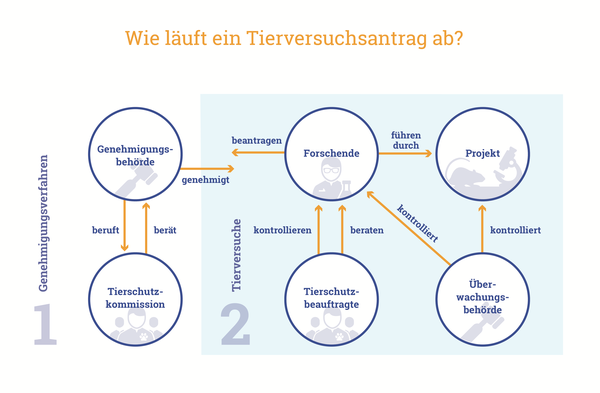Animal welfare at the FLI
Taking animal welfare seriously means accepting a high level of responsibility for the welfare of laboratory animals. At the FLI, specially trained animal caretakers and veterinarians therefore ensure that the living conditions for the animals in the facility are species-appropriate and that special care is taken to ensure the well-being of the laboratory animals.
Animal experiments are only carried out if they are indispensable. This is the case when new research results cannot be obtained by any other methods, such as experiments using cell cultures, computer models or other alternative methods.
Animal welfare at the FLI entails that experimental animals be treated gently during experiments. They should experience as little pain or suffering as possible and, if necessary, be provided with adequate pain medication. During an experiment, scientists perform the necessary procedures and treatments on the animal according to established veterinary procedures and techniques. The , usually a veterinarian, advises and monitors these animal experiments. Animal welfare officers pay close attention to ensure that no animal is used excessively for an animal experiment, and they make sure that no animal suffers unnecessarily.
The use of alternative methods enables the FLI to regularly avoid animal experiments. However, biomedical research cannot yet completely dispense with experiments and studies involving animals, especially when it comes to researching diseases such as cancer or diabetes mellitus, or systemic diseases and changes during aging, all of which arise from complex biological processes.
The living and housing conditions of the laboratory animals at the FLI are subject to the principle of animal welfare. The animals are cared for by trained caretakers. The animal facility managers, PhD scientists or PhD veterinarians, are responsible for and supervise the respective animal husbandry (at the FLI: mouse and fish). Together with the institute’s veterinarians, they ensure that the animals are housed in a manner appropriate to their species (for example, in the case of mice, this includes nesting, hiding places, social contact with their fellow species, gnawing material). All researchers as well as all other employees in the field of animal experiments are trained in laboratory animal science.
To protect laboratory animals, animal experiments in Germany are subject to strict regulations. An application for each animal experiment must be submitted to the competent authority – in the case of the FLI, the . The application goes through a multi-stage review process that follows the globally accepted . First, animal welfare officers appointed at the FLI review the application; in a second step, the authority examines it together with a supporting commission. The main question is whether the scientific necessity/indispensability of an animal experiment has been established, i.e. whether there are really no alternative methods that could be used to answer the research question.
In addition, the authority examines whether the animal experiment is justifiable with regard to the protection of animals laid down in the German Constitution (§ 20) and in the Animal Protection Act (§1) and checks whether the anticipated suffering of an animal in an experiment is in acceptable proportion to the potential gain in knowledge. In addition, it evaluates the extent to which the number of experimental animals used is actually necessary to obtain meaningful research results (plausibility) and checks which measures are taken to reduce the actual stress on the animals in the experiment (e.g. administration of painkillers or habituation to humans through animal training).
Contact
Dr. Patricia Schmidt
Animal Welfare Officer
+49 3641 65-6723 tierschutz@~@leibniz-fli.de
Viviane Ständert
Animal Welfare Officer
+49 3641 65-6011 tierschutz@leibniz-fli.de











